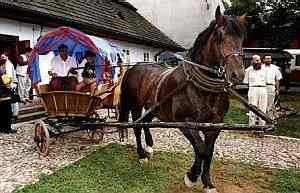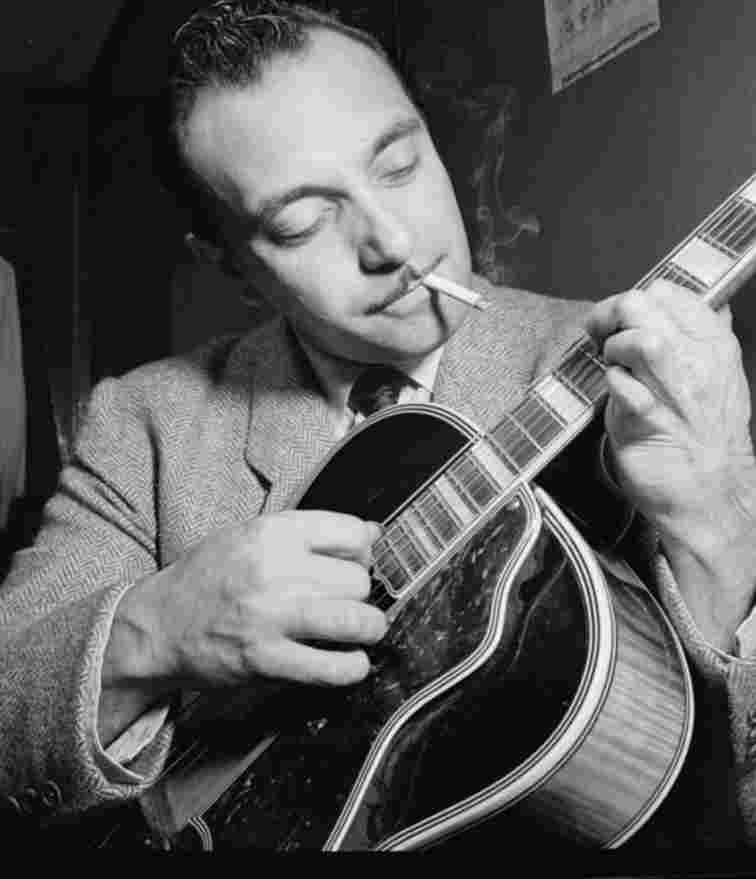Born in Eastern
Europe, my mother never negatively predisposed her children
towards gypsies. Neither positively, it must be said. And I
suppose we supposed that, unlike my father and his gender, she
wasn't well disposed towards Gypsy Rose Lee, a wanderer in her
own right.
But unlike my mother,
whose private thoughts about the world were mostly correct,
most Europeans had long ago decided that gypsies were not their
favourite people, who along with the Jews became the fodder
of choice for the death camps in WWII to the tune of 600,000.
 We
are all familiar with the gypsy stereotypes, some of which are
not entirely baseless: they are clannish, conniving, unclean,
downright dishonest. Many good, downright self-righteous people
insist the gypsy is proof that a gene for thievery exists. Here
in America, (North, Middle, South and Offshore) we only have
to look to our elected officials to mark that same gene. But
stereotypes notwithstanding, we know as fact the gypsy has gone
about the business of his life with a quiet defiance that belies
the systematic exclusion and persecution that have dogged him
since his arrival in Europe in the late Middle Ages, that despite
best laid plans, the gypsy is still very much a wanderer in
especially Eastern Europe, which makes him an enigma and subject
of this inquiry. For if we are at all curious about the secret
sources of his strength and survival, and the tenacity with
which he guards his way of life, we will make the necessary
effort to explode the categories that imprison him -- and us.
We
are all familiar with the gypsy stereotypes, some of which are
not entirely baseless: they are clannish, conniving, unclean,
downright dishonest. Many good, downright self-righteous people
insist the gypsy is proof that a gene for thievery exists. Here
in America, (North, Middle, South and Offshore) we only have
to look to our elected officials to mark that same gene. But
stereotypes notwithstanding, we know as fact the gypsy has gone
about the business of his life with a quiet defiance that belies
the systematic exclusion and persecution that have dogged him
since his arrival in Europe in the late Middle Ages, that despite
best laid plans, the gypsy is still very much a wanderer in
especially Eastern Europe, which makes him an enigma and subject
of this inquiry. For if we are at all curious about the secret
sources of his strength and survival, and the tenacity with
which he guards his way of life, we will make the necessary
effort to explode the categories that imprison him -- and us.
 One
of the first things we learn about gypsy culture is that it
rejects what we most esteem in ours. We place extraordinary
value in home, territory and rootedness; the gypsy is the last
of the Temperate Zone's nomads. We are products of the mostly
Protestant work ethic; the gypsy works with his wits. We stress
individuality; the gypsy is inseparable from the communities
he forms. We exist for future things, vacations, new technologies,
retirement; the gypsy dwells in the present indicative. Inescapably,
for the gypsy who chooses to be a gypsy rather than assimilate,
his way of life is a critique of our own, of values we deem
sacred and inviolable.
One
of the first things we learn about gypsy culture is that it
rejects what we most esteem in ours. We place extraordinary
value in home, territory and rootedness; the gypsy is the last
of the Temperate Zone's nomads. We are products of the mostly
Protestant work ethic; the gypsy works with his wits. We stress
individuality; the gypsy is inseparable from the communities
he forms. We exist for future things, vacations, new technologies,
retirement; the gypsy dwells in the present indicative. Inescapably,
for the gypsy who chooses to be a gypsy rather than assimilate,
his way of life is a critique of our own, of values we deem
sacred and inviolable.
How the various
gypsy populations came to embrace their way of life is inseparable
from their history. Of the many theories of their origins and
subsequent diaspora, most favour the one that finds them in
Northern India, in what is now Pakistan, descended from the
warrior and priestly castes. For centuries they defended their
kings against waves of Muslim invasions, until beginning in
the 13th century they were forced to flee, mostly to Europe,
where they were at first received hospitably, as guests, in
Bulgaria, Greece (Macedonia) and Serbia. It was when they decided
to settle permanently, Europe showed its true (Caucasian) colours,
and itself short on tolerance. Confronted for the first time
in its history with a non-invading people of colour as well
as a religion that was entirely foreign, Europe’s host
countries reacted by issuing arbitrary decrees forbidding gypsies
to buy land and practice their trades and professions, the spirit
of which continues to inform the politics of today in many European
countries. So contrary to popular belief, the gypsies are not
born itinerant. It was first in Pakistan, and then as early
as the 14th and 15th centuries in Europe, consequent to systemic
exclusion, they were forced to take up a caravanesque existence,
and of necessity, had to learn to live (beg, borrow and steal)
by their wits, handicrafts and music.  What
is at once remarkable and disconcerting is that despite innumerable
advances in the standard of living over the centuries, very
little has changed in the uneasy relationship that keeps the
gypsy and European in a state of permanent opposition. The European,
initially through his edicts and now his attitude, creates and
sustains the very category of ‘otherness’ he scorns,
and then blames the victim for being different. Sound familiar?
What
is at once remarkable and disconcerting is that despite innumerable
advances in the standard of living over the centuries, very
little has changed in the uneasy relationship that keeps the
gypsy and European in a state of permanent opposition. The European,
initially through his edicts and now his attitude, creates and
sustains the very category of ‘otherness’ he scorns,
and then blames the victim for being different. Sound familiar?
So if Europe’s
(I.Q.) intolerance quotient first gained notice with the arrival
of the gypsy, it later, in the 15th century, hit new highs at
the expense of the Jews in Spain, then the Huguenots in France
before going off the charts during WWII.
But despite half
a millennium’s worth of persecution, the ever-resourceful
gypsy would not disappear gently into the night. Rejection and
persecution became part of his founding myth that made him stronger,
more self-assured and more determined than ever, a challenge
to overcome again and again, generation after generation.
At some point in
his tragic history, the gypsy chooses to be a gypsy, and not
a European, a startling fact that begs the question: what is
it that he is rejecting and why? I propose that with the introduction
of the Protestant work ethic and the Industrial Revolution which
transformed families and societies into units of production,
the gypsy, in his cohesive, tightly-knit, psychiatrist-free
communities, observing the psychological and philosophical (spiritual)
damage done to materialism’s devotees, accidentally discovers
the salutary basis of his own way of life and for the first
time consciously chooses it (a nomadic, marginalized existence),
and implicitly assumes responsibility for the numerous risks
it entails. The Industrial Revolution -- its multiplying darknesses
and growing obsession with profit -- makes the gypsy aware of
an unsuspected range of safeguards and protections provided
by his community, which sparks a significant appreciation of
his culture and autonomy, the latter inoculating him against
the Industrial Revolution’s worst effects: disease and
poverty. We note that among Charles Dickens’s tatterdemalion
crew of imps, urchins, orphans and dispossessed, there is no
mention of gypsies.
There is much to
learn from this, especially if we acknowledge that the spirit
of the gypsy, however dormant, lives in us all. Which would
mean hatred of the gypsy is in fact disguised self-hatred, or
envy of a people who have had the courage and force of community
to preserve those traditions to which we have given short shrift,
all in the name of modernism that pretends to represent man
(piously secular and free to conform) in his most evolved state.
Freud, in Civilization and Its Discontents, reminds
us that we suppress the ‘id’ (the idiom of our spontaneity)
at our own peril.
And while it is
true that the gypsy continues to forge those unlikely conditions
that favour the survival of his endangered spirit, unless the
West begins to take a genuine interest in gypsy culture as an
alternative value system, that once indomitable spirit risks
disappearing altogether.
Any culture, without
a representative literature and art, or at a minimum, spokespersons
capable of assuring the unity and cohesiveness upon which a
group’s survival depends, is at great risk. From the first
opportunity provided by the Industrial Revolution to the present,
the gypsy has squandered numerous opportunities where he could
have positively defined his natural opposition to the ways of
modernity, and carved out a significant metaphysical space for
his principles. But instead he has allowed himself to be defined
by a mythology that reduces him to being either a social miscreant
or an incurable romantic, while the reasons his destiny bears
directly on the destiny of 21st century values have been left
unsaid. This failing, still insufficiently acknowledged, leaves
the gypsy at the crossroads.
Since we are all
living in an increasingly homogenized, globalized world where
unlike cultures and values are competing and colliding (and
disappearing) as never before, the pressure to embrace the new
has never been greater. Having endured, if not thrived on the
worst of Europe’s exclusionary practices, there are significant
points of departure in gypsy culture that represent a legitimate
alternative to European values. But the European isn’t
hearing the message because the gypsy hasn’t grasped the
importance of articulating the organizing principles upon which
his way of being is founded, of making explicit the meaning
of his history that culminates in a philosophy or narrative
whose relevance we are only beginning to suspect. Nietzsche
would say the gypsy must come to the fore and transform his
personal destiny into a world destiny. For if the gypsy fails
the occasion of the richness and communitarian basis of his
alternative culture, the modern world will lose a living example
by which it can remake itself by resuscitating and prioritizing
those community values that are the cornerstones of every humanity.
So while we admire
the gypsy for refusing the alibi of victimhood, if in the end
it is his fate to be crushed beneath the wheel of modernity,
it won’t be consequent to exclusionary practices that
persist, but because he, himself, has failed to effectively
disclose and disseminate his values in a world withering thin
in a crisis of values. As an unfinished character in search
of an author, he will have written his last chapter.